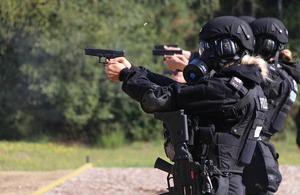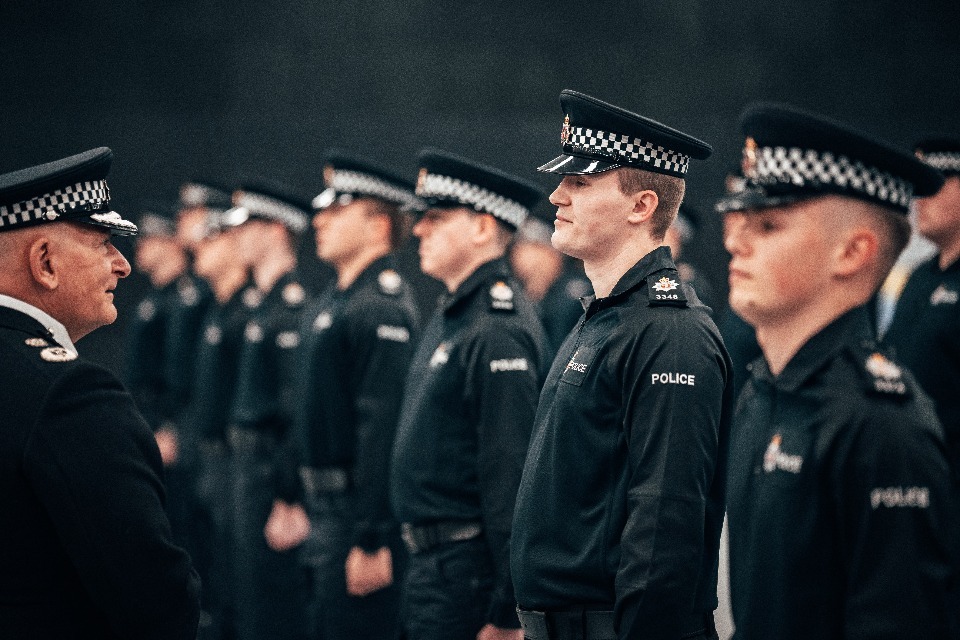Data-driven overhaul boosts officer training pass rate by 15%
From bespoke tuition to inclusive coaching, CNC’s refreshed training gives recruits the tools to succeed in armed policing.

The Civil Nuclear Constabulary (CNC) has boosted its armed officer training success rate by 15% in just over a year, following a data-driven transformation of the firearms phase of its Initial Foundation Programme (IFP).

Focused on inclusion, tailored support, and high performance, the revised approach has raised the overall IFP pass rate from 61% to over 77%.
Notably, one of the most demanding elements of the course – weapon accuracy and handling – has recorded an 88% fall in the number of recruits who did not meet the required standard, reflecting substantial progress in both candidate readiness and instructional delivery.
This improvement follows the landmark IFP100 cohort in July 2024, which prompted a comprehensive review of training delivery.
The initiative identified common challenges faced by recruits and introduced a range of targeted support measures, including one-to-one coaching, additional tuition, pistol-focused instructor seminars, and data-led analysis of high-risk components. These enhancements have been carefully designed to ensure every candidate has a fair opportunity to succeed, without compromising the IFP’s intensity or expectations.
The CNC’s commitment to inclusivity extends to recruits requiring additional assistance, including female recruits and those encountering early difficulties. This approach has helped ensure equal opportunity across the cohort.
PC Lori Marshall, one of the officers to benefit from the revised training model, said:
“When I first failed, a Sergeant was very reassuring – he checked on me and allowed me try different Glock models to see which fitted my hands best. That really took away my worry. I wasn’t failing because I couldn’t handle or shoot, I had let my nerves get the better of me.
“Once I understood things could improve, my confidence grew. Spending so much time with my peers almost made us like a family. Being the only female on my first course was daunting, but everyone welcomed me.
“I struggled to shout loudly during drills, but one instructor had me shout at him a few times, and another taught me to use volume from my stomach and lungs rather than my throat – suddenly, I started passing assessments and believing in my improvement.
“Setbacks were tough, but reflecting on what went wrong and pushing myself out of my comfort zone made me more resilient. Now I’m confident in my abilities.”
Training is delivered at Griffin Park, in Cumbria; Bisley, in Surrey; and Dounreay, in Caithness. Recruits undertake an intensive 18-week College of Policing-compliant course covering firearms skills, public and personal safety, incident response, and scenario-based exercises in a range of operational environments.
The training replicates the full spectrum of challenges officers may encounter while safeguarding the UK’s critical nuclear infrastructure.
Over the 12 months, 129 new recruits have successfully completed the IFP and are now deployed across England and Scotland. A further 32 candidates deferred to receive additional training, while 18 chose not to continue their CNC careers.
The CNC remains committed to refining the IFP by applying lessons learned from each cohort and continuing to invest in inclusive support, recruitment development, and performance monitoring.
The goal is to ensure every graduate is not only fully qualified but fully prepared for the unique demands of protecting the UK’s most sensitive sites.
A/Superintendent Adam Robson, who leads the CNC’s training programmes, emphasised that the 18-week IFP remains both rigorous and inclusive.
“Officers who graduate from our IFP are well trained and prepared to provide an overt armed policing capability at both nuclear and non-nuclear sites which form a part of the UK’s National Critical Infrastructure,” he said.
“We develop our candidates through a supportive programme that adapts to individual needs, while maintaining the College of Policing standards set out in the National Police Firearms Training Curriculum. Inclusion, support and psychological safety are key elements of a successful programme.”
“The improvement in the IFP pass rate stands as a testament to the professionalism and dedication of our Firearms Instructors and I’m incredibly proud of their work. Through the development and implementation of a targeted training program and adaptive working practices, they have acknowledged that candidates begin their journeys from varying starting points.
“Their commitment to providing bespoke and tailored tuition where appropriate has played a vital role in accelerating individual candidate development and supporting our overall success.”